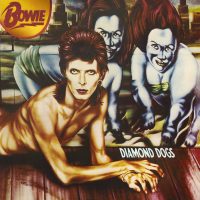 Recorded: October 1973 – February 1974
Recorded: October 1973 – February 1974
Producer: David Bowie
Engineer: Keith Harwood
Released: 24 May 1974
Personnel
David Bowie: vocals, guitar, saxophone, percussion
Mike Garson: piano, Moog synthesizer, Mellotron, harpsichord
Herbie Flowers: bass guitar
Tony Newman, Aynsley Dunbar: drums
Alan Parker: electric guitar
Unknown: flute
Tracklisting
Contents
- ‘Future Legend’
- ‘Diamond Dogs’
- ‘Sweet Thing’
- ‘Candidate’
- ‘Sweet Thing (Reprise)’
- ‘Rebel Rebel’
- ‘Rock ‘N’ Roll With Me’
- ‘We Are The Dead’
- ‘1984’
- ‘Big Brother’
- ‘Chant Of The Ever Circling Skeletal Family’
Diamond Dogs, David Bowie’s eighth studio album, was a concept album loosely based on George Orwell’s Nineteen Eighty-Four.
Bowie had hoped to create a theatrical production of Orwell’s book, and began work on the project after completing Pin Ups in 1973. However, he was denied the rights to the novel by Orwell’s widow Sonia Brownell, so reworked the concept accordingly.
In retrospect, it [dystopia] has been a strong theme in the work that I’ve done down the years. In fact, I think if there is any consistency to what I do it, it’s going to be the lyrical content. I’m saying the same thing a lot, which is about this sense of self-destruction.I think you can see the apocalyptic thing as the manifestation of an interior problem. There’s a real nagging anxiety in there somewhere, and I probably develop those anxieties in a ‘faction’ [fact/fiction] structure.
Mojo, July 2002
Although the characters and lyrical scenarios in Diamond Dogs are predominantly Bowie’s own, clear traces of Orwell’s creations remain. These are most prominent in the album’s second half, particularly in the songs ‘1984’ and ‘Big Brother’.
So I changed track real fast and converted it into Diamond Dogs, which was more of an effort than Ziggy. Thinking back, we didn’t do anything on stage with Ziggy: all I had was a few costume changes. It was just the songs and the trousers. That’s what sold Ziggy. I think the audience filled in everything else.But Diamond Dogs I intended to do something for. We had a bit more money by then – though not enough, apparently: it actually put me into bankruptcy. But that kind of started a lot, the Diamond Dogs show, in terms of you could do something more interesting on stage than just wear blue jeans. It was quite fun, but I got bored half way through and threw the set away, so I’ve only got myself to blame.
Mojo, July 2002
The 29 September edition of Melody Maker carried a report that Bowie was working on a theatre revue, which was to be staged in London’s West End in 1974. However, MainMan’s request to adapt Nineteen Eighty-Four was refused, forcing Bowie to create a new concept.
This was The 1980 Floor Show, its title based on Orwell’s work. The idea came about after Bowie was approached by US television producer Burt Sugarman, who invited the singer to create a show for the Midnight Special rock music series.
It was arranged for the show to be filmed and televised on NBC in America. Bowie had the idea for a variety show featuring his band and various other performers, and was granted total artistic control.
The 1980 Floor Show’s clearest antecedent was the Rolling Stones’ Rock and Roll Circus, a television special with a range of performers which was filmed in December 1968.
Bowie was simultaneously working on a theatrical adaptation of the Ziggy Stardust concept. On 18 October 1973, the first day of filming for The 1980 Floor Show, writer Tony Ingrassia arrived in London from New York to work with Bowie on staging ideas for the Ziggy show.
